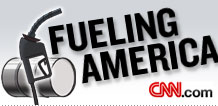|
Putting ethanol in the fast lane Famed venture capitalist calls for four policy changes to help put the plant-based fuel back in the spotlight. NEW YORK (CNNMoney.com) -- Despite falling oil prices and a corresponding drop in the stock price of various ethanol companies, famed venture capitalist, Sun Microsystems co-founder and ethanol investor Vinod Khosla outlined four steps he said would help the country use more of the plant-derived fuel. Speaking at a Cleantech Venture Forum conference in New York City, Khosla told a roomful of fellow venture capitalists that a couple of government mandates and a shift in the subsidy policy would go a long way in helping bring more ethanol to market.
Specifically, he called for a government mandate that 70 percent of all cars sold in the U.S. be flex-fuel - which is having the ability to run on gas, ethanol or other alcohol-based fuels - by 2014, and that 10 percent of all major-branded gas stations in the U.S. sell E85, a fuel that contains 85 percent ethanol. The move is an attempt to allay concerns by the oil industry that there aren't enough ethanol cars to make installing E85 pumps worthwhile, and simultaneous concerns by the auto industry that people won't buy ethanol cars because there's no place to fill them up. He also said the current government ethanol subsidy of 50 cents a gallon should be based on a sliding scale corresponding to the price of oil: 25 cents a gallon if oil is at $75 a barrel ranging up to 75 cents a gallon if oil falls to $25 a barrel. "It indicates to Saudi Arabia, or (Venezuelan President Hugo) Chavez or whoever your favorite manipulator is that they can't manipulate the markets" and drive out alternative fuels, he said. When asked who would pay for these mandates, Khosla indicated it would be up to to industry or the government. He said installing the gas pumps would cost something less than a billion dollars and making cars flex-fuel amounts to $35-$100 a vehicle. "We're spending so much on energy security, spending that kind of money is a worthwhile investment," he said. He also called for lifting tariffs on imports of ethanol from Brazil, a move strongly opposed by U.S. farmers, in exchange for increasing corn-derived ethanol in gasoline from 10 to 15 percent, a move he said was supported by some in the agriculture industry. Most ethanol in America is currently derived from corn. Using corn-based ethanol as a fuel has been criticized for its potential to drive up food prices and its ability to provide only a fraction of the the country's total gasoline demand. Khosla also has investments in cellulosic ethanol, a nascent but promising technology that involves making ethanol out of nearly any plant, wood or other biomass source, not just food crops. "The president loves biomass, the farmers love biomass, even evangelicals love biomass" because it decreases the county's reliance on the Middle East, he said. "As investors we should make this happen because its good for the country." Oil produced by such companies as BP (down $0.61 to $65.35, Charts), ConocoPhillips (down $0.39 to $57.82, Charts) and Exxon Mobil (down $0.14 to $64.64, Charts) has become the subject of debate as its cost rises, climate change becomes more visible and tensions in the Middle East and South America underscore the U.S. dependence on crude. --------------------------------------------------------------------- |
|

